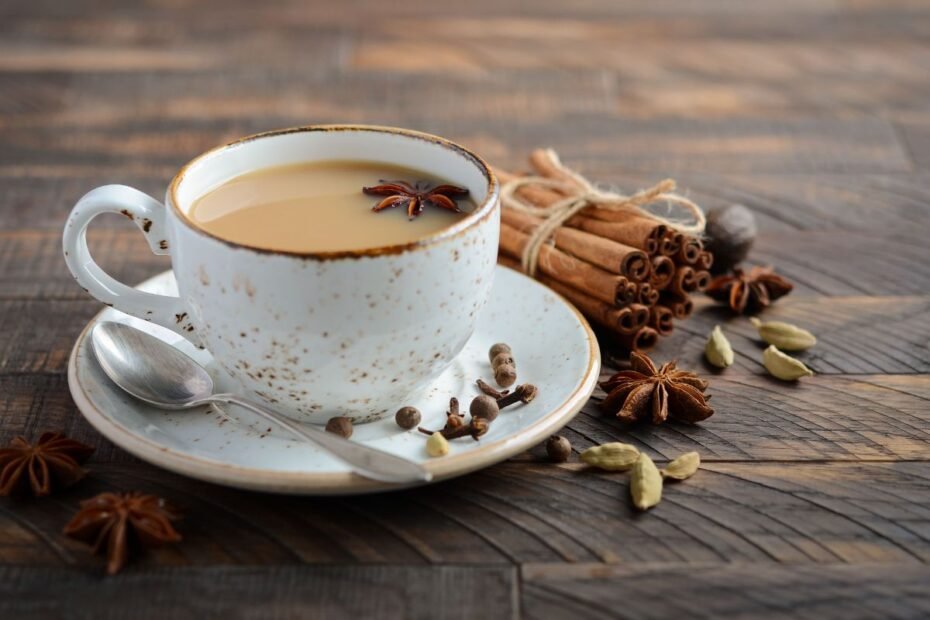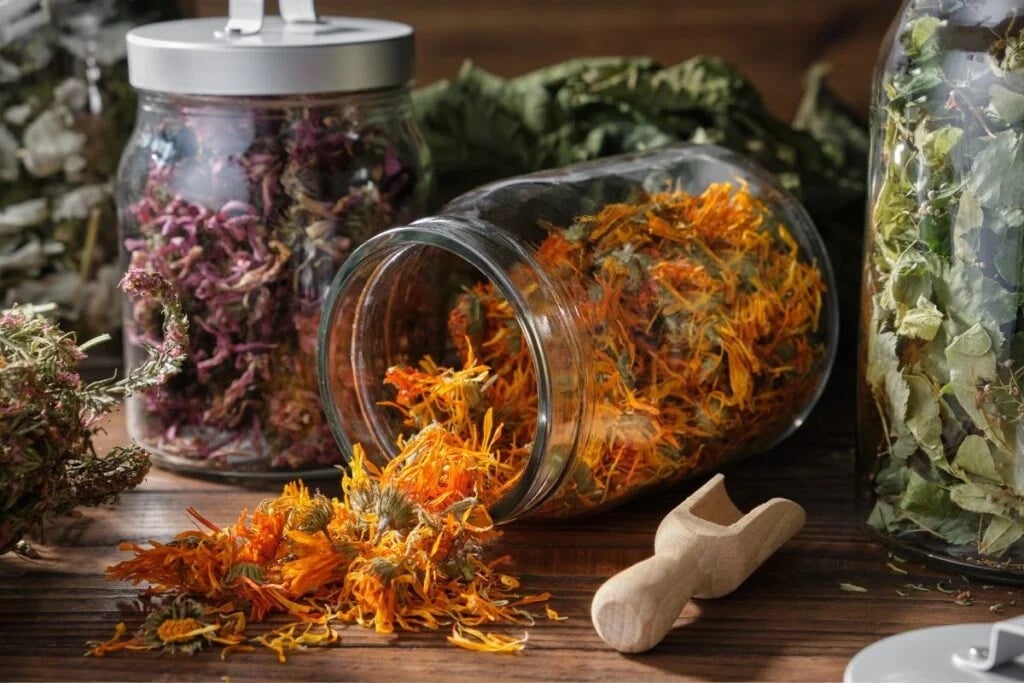Cinnamon is one of the most popular and commonly used spices worldwide. It enhances the taste of almost everything, from dishes to desserts. Cinnamon’s versatility allows to use it for various dietary tastes. Cinnamon tea is one of the uses of this spice, where the cinnamon tea benefits expressed the most.
Cinnamon bark is a material for essential oil production. The oil is a part of confectionery, liqueurs, perfumery, and pharmaceuticals.
About Cinnamon in Brief
Cinnamon (Cinnamomum verum) is a tree belonging to the Lauraceae family. It occurs naturally on the Indian Ocean island of Sri Lanka (formerly known as Ceylon). Cinnamon is also cultivated in South America, the West Indies, and Myanmar. The true cinnamon, with a pleasant aroma, a mildly sweet taste, and beneficial properties for the body.
Cinnamon is an evergreen tree that grows up to 10–15 m tall. Its leaves are lanceolate, large, bright green, and glossy. The flowers are small, yellowish in color, in sparse clusters. The tree bark is a favorite spice and is extracted by peeling it from the young twigs. When dried, the bark takes on the familiar shape of twisted sticks, which are cut.
Cinnamon also refers to other products extracted from species related to cinnamon. You can find in the market Chinese cassia (Chinese cinnamon), Vietnamese or Saigon cinnamon, and Indonesian cinnamon. Although all of these products are considered cinnamon, it is essential to be aware that they contain the carcinogenic substance coumarin. Its frequent consumption is toxic to the liver. Therefore, to reach the benefits of cinnamon tea and the taste, one should choose genuine (Ceylon) cinnamon.
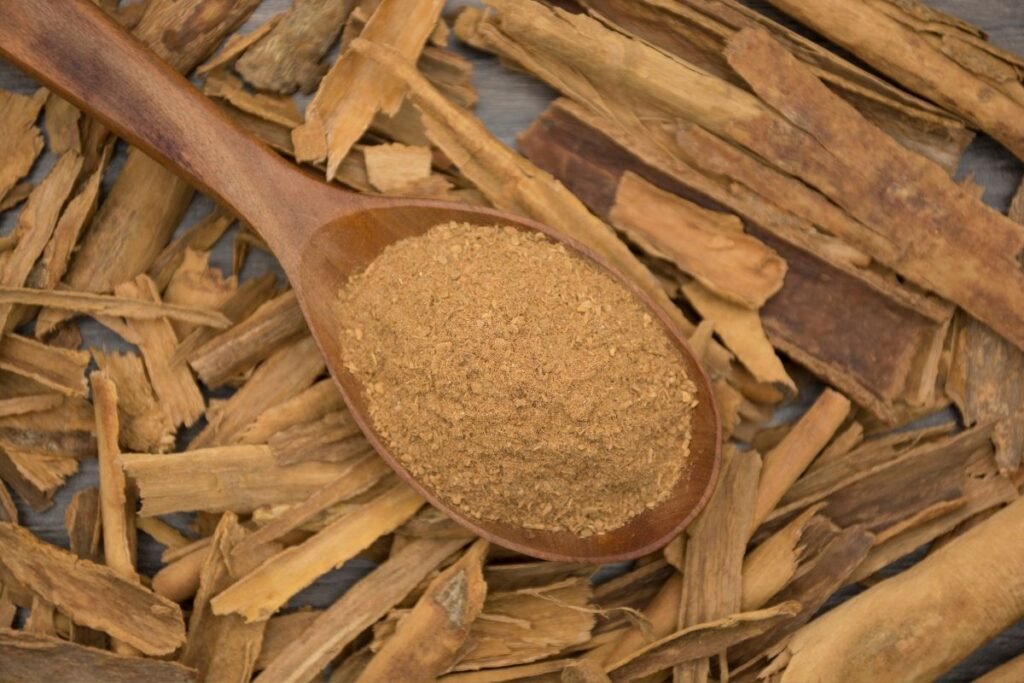
Health Benefits of Cinnamon Tea and Spice
In Ayurveda (traditional Indian medicine), the use of cinnamon for health purposes dates back thousands of years. Scientific research into the effects of cinnamon on the human body does not yet have such a long history, and much remains to be discovered. However, there are also already credible sources supporting these benefits of cinnamon tea and spice:
- Consumption of cinnamon extract significantly reduces the inflammation and clinical symptoms of rheumatoid arthritis.
- Cinnamon is rich in antioxidants. Therefore, cinnamon can increase the body’s ability to fight free radicals and prevent disease.
- This spice contains heart-healthy compounds that lower bad cholesterol and raise good cholesterol. These properties make cinnamon a successful agent for controlling high blood pressure.
- Cinnamon can help lower blood sugar levels. Its effects may protect against type 2 diabetes.
- The spice helps fight bacteria, fungi, and mold. It can also prevent tooth decay.
- Cinnamon relieves menstrual pain, can help reduce heavy bleeding, and relieves PMS symptoms.
Cinnamon Tea Characteristics
As well as being used in dishes, cinnamon, whether in sticks or ground, can also be used to make a flavorful and healthy tea. A ‘basic’ cinnamon tea requires only three ingredients: cinnamon, water, and ordinary bare (e.g., black) tea. You can use both cinnamon sticks and powder. Incidentally, you can reuse the same cinnamon sticks 3-5 times as long as they do not lose flavor. However, the sticks should dry thoroughly between uses to prevent them from becoming moldy.
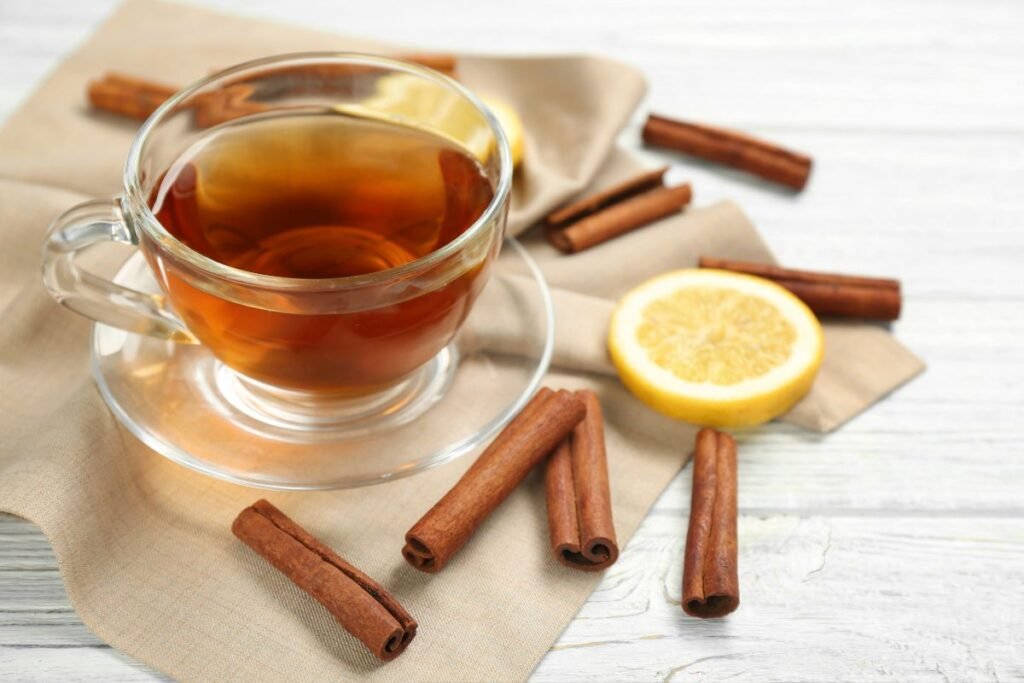
Brewing Tea with Cinnamon Sticks
There are two methods to brew tea where cinnamon stick tea benefits do not differ from powder making.
Ingredients:
- 1 cinnamon stick;
- A cup of water;
- 1 teaspoon of your favorite herbs.
Place the cinnamon stick in a tea-making vessel covered with boiling water, cover, and leave to steep for 10 minutes. Add the herbs and boil over low heat for 1–2 minutes. You should strain the tea before drinking. This tea is recommended to be drunk hot or warm.
Making Tea with Cinnamon Powder
Ingredients:
- ½–1 teaspoon cinnamon powder;
- 1 cup of water;
- 1 teaspoon of your favorite tea (optional).
Cover the cinnamon powder with boiling water and leave it to stand for 3–5 minutes. This tea is ready to be enjoyed! However, you can add your favorite herbs and heat it for 1–2 minutes.
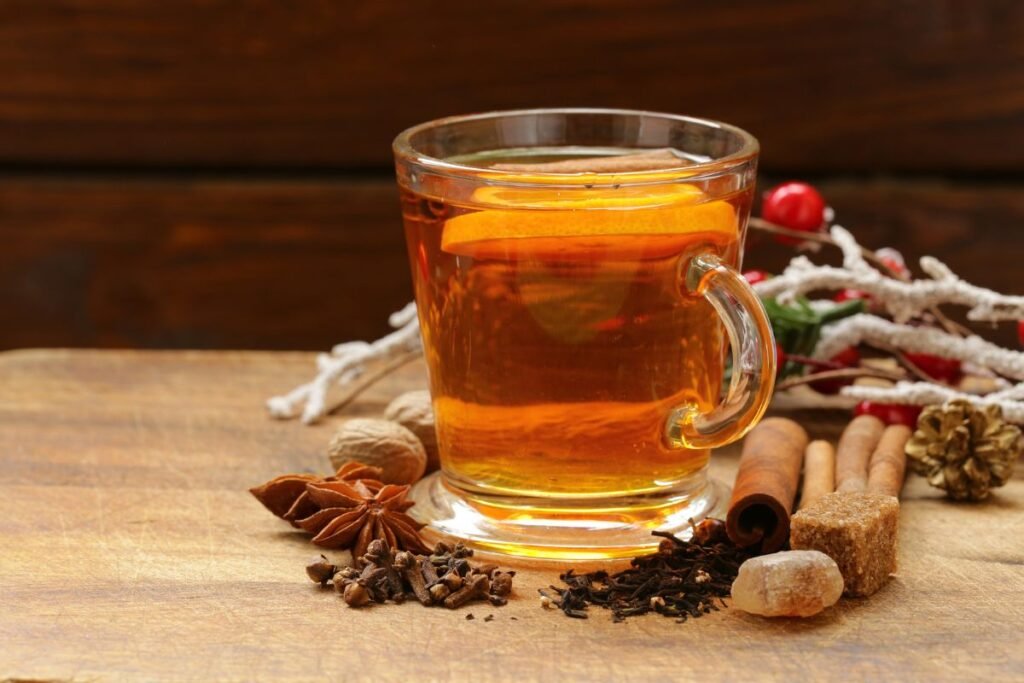
Cinnamon Tea Variations
Cinnamon is a highly versatile spice used to flavor a variety of teas. It is a common ingredient in relaxing, immune-boosting teas. You can combine cinnamon with ginger, turmeric, and honey for cold treatment.
Cinnamon sticks or powder can add even more flavors and colors to tea. Here are some ideas for a cup of cinnamon tea:
- One or two thin slices of ginger will give the tea a spicy, savory flavor, which increases its benefits. Ginger and cinnamon tea benefits improve gut, brain, and heart health and naturally boost immunity.
- Milk (cow’s or vegetable), honey, or maple syrup will give the tea a creamy texture reminiscent of late coffee.
- Adding lemon juice to the tea gives it a naturally sweet and sour taste. Lemon juice also changes the color of the tea to a pale yellow.
- If you prefer orange, it is a perfect match for cinnamon tea. Add orange juice or a little grated orange peel.
- Apples and cinnamon are another classic combination. Add dried apples, or use freshly squeezed juice. Apples and cinnamon tea benefits include lowering inflammation and blood sugar levels, better heart health, and possibly weight loss.
- Cinnamon, turmeric, black pepper, and honey are another combination that is particularly helpful against colds.
- The bay leaves added to cinnamon tea give it an unusual, spicy flavor. This combination increases the effectiveness of weight loss. It is one of the main cinnamon and bay leaf tea benefits.
- Cloves added to a cup of cinnamon tea give a pleasantly spicy taste but raise blood sugar levels. Take it into account, if you are related to health problems. Clove and cinnamon tea’s benefits: to help reduce stress, relax better, and improve the quality of your sleep.
- A pinch of nutmeg, cayenne pepper, etc. can also add an undiscovered, spicy flavor to cinnamon tea.
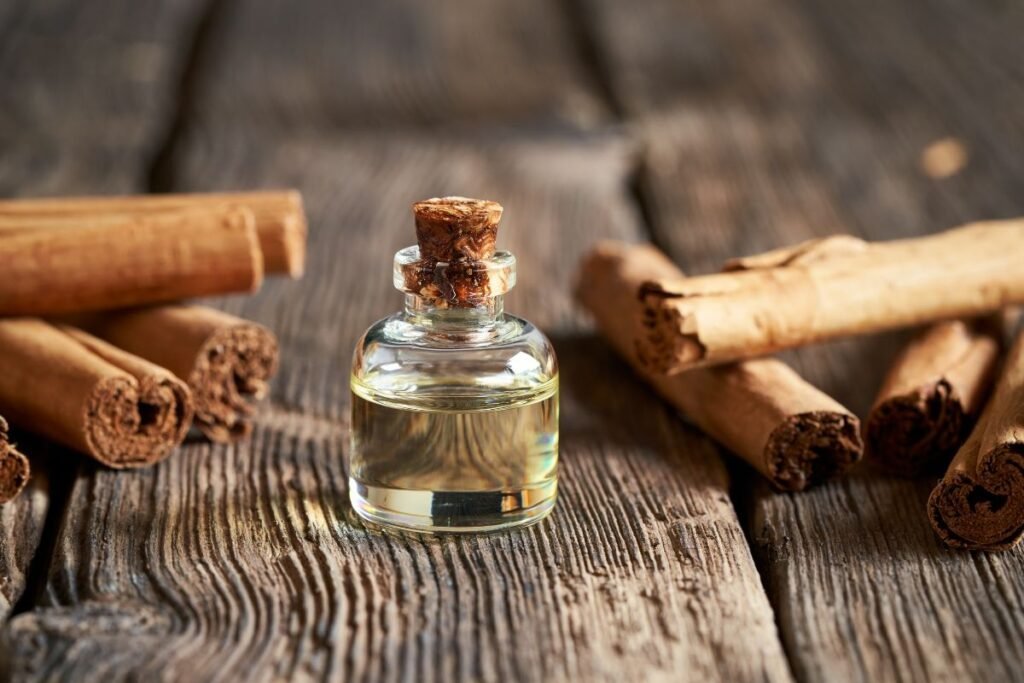
Cinnamon in Cosmetic Products
Cinnamon has effective antiseptic properties for problematic, acne-prone skin care. It is also effective in fighting free radicals and preventing skin aging. Cinnamon has a beneficial exfoliating and skin-brightening effect. Another “bonus” of cinnamon for beauty is that it plumps the lips!
Cinnamon Face Mask for Acne
Mix 1 teaspoon of cinnamon powder with 1 tablespoon of honey. Apply a thin layer of this paste to your face and leave it on for 15 minutes. Then wash it off with lukewarm water.
Cinnamon Mask to Plump Lips
Mix a few drops of cinnamon essential oil with 1 teaspoon of olive oil. Apply this mixture liberally and thoroughly to the lips, and leave on for 5 minutes. You should feel a tingling sensation. Wipe the mask off with a napkin and rinse with water.
Cinnamon Scrub for Softening the Feet Skin
Mix 1 tablespoon of cinnamon powder and 1 heaped tablespoon of rock salt. Add 1 tablespoon of honey and 2 tablespoons of olive oil to this mixture, and mix well until smooth and thick. Rub this scrub over the wet skin of your feet for a few minutes, and rinse with warm water.
Cinnamon Tea Consumption and Possible Side Effects
True (Ceylon) cinnamon is safe to consume in most cases. The recommended daily intake is 1-2 cups of tea or 1-2 teaspoons of cinnamon in food. Taje the cinnamon with food to help lower blood sugar levels. Drink the cinnamon tea in the morning or evening before bedtime.
However, be aware when using cinnamon with diabetes. If you are on medication that affects blood glucose levels, consult your doctor before using cinnamon. Taking cinnamon together with these medicines can dangerously lower blood glucose levels.
It is vital to know that cinnamon-related products (discussed at the beginning) negatively affect the liver. Substitutes for true cinnamon, used in equivalent quantities, can cause indigestion, vomiting, and headaches. In the long term, they can also lead to severe health problems by damaging the liver or provoking cancer.
Sources:
https://www.britannica.com/plant/evergreen-plant
Shishehbor F, Rezaeyan Safar M, Rajaei E, Haghighizadeh MH. Cinnamon consumption improves clinical symptoms and inflammatory markers in women with rheumatoid arthritis. J Am Coll Nutr. 2018;1-6. doi:10.1080/07315724.2018.1460733
Kizilaslan N, Erdem NZ. The effect of different amounts of cinnamon consumption on blood glucose in healthy adult individuals. Int J Food Sci. 2019;2019:4138534. doi:10.1155/2019/4138534
https://www.healthline.com/nutrition/cinnamon-tea-benefits
https://www.alphafoodie.com/how-to-make-cinnamon-tea/
https://www.myglamm.com/glammstudio/cinnamon-benefits-for-skin
Associative photos from © Canva.
